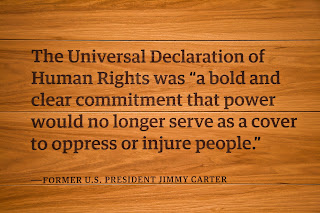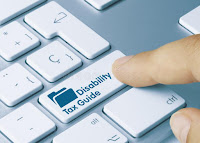 Back in the mists of time, we briefly discussed a human rights complaint brought against the Province regarding the Disability Support Program.
Back in the mists of time, we briefly discussed a human rights complaint brought against the Province regarding the Disability Support Program.
The case has had a very
long and somewhat torturous* history (during which the
provincial government repeatedly flipflopped on whether it would appeal any adverse rulings**), but at the end of the day,
it has turned into a ground-breaking human rights decision from Nova Scotia (of all places!).
At any rate, a huge shout out to
the Disability Rights Coalition, who spearheaded the whole thing.
For anyone not in the know,
back in 2015, a human rights complaint was brought against the Province
regarding three intellectually challenged adults who had been locked in
a mental institution for (literally) years for no good
or defensible reason. Although legitimately admitted at one
point, they were trapped there long past when they should have discharged
because no "suitable housing" could be found in the community.
Although initially successful for the three individual complainants***, the Commission refused to extend its remedy in a way that might help other individuals subject to the Disability Support Program's residential options.
Eventually, we made it to
the Nova Scotia Court of Appeal where the claim of systemic discrimination was found to be valid.
HALLELJUAH
An interim settlement was negotiated, with yet another
independent expert report, this time to advise to how the
systemic discrimination in the Province's provision of supports and services
could be resolved.
However, unlike other studies and reports over years
which were shelved by the government, this one has some teeth. You can read the
full report here, but if you would prefer the
Executive Summary in "plain language" (I know I would!), I suggest you go here.
All of which had led us here:
... there will be a series of in-person sessions held across the Province for participants and their families/support networks. The sessions will be an opportunity to com together to discuss the content of the technical report and the next steps.
The sessions will take place between May 30 and June 14 in nine communities across the province. Please see below for the schedule. Each session will be two hours and will consist of a brief presentation from People First Nova Scotia (disability self-advocacy organization) reps along with Randy Acker, DSP Director. There will be time for smaller individual and group discussions within the venue to allow people to ask questions and gather the information they need. Light snacks and refreshments will be provided. If participants require additional transportation funding to attend the session, please contact your care coordinator.
The list of dates and locations
follow:
Bridgewater - NSCC
- Lunenburg Campus 75 High St Bridgewater, NS B4V 1V8 Tuesday May 30 --
1:30-3:30 PM or 5:30-7:30 PM
Yarmouth -YACRO Hub 6 Thurston St.
Yarmouth, NS B5A 4K5 Wednesday May 31 -- 1:30-3:30 PM or 5:30-7:30 PM
Kentville - Kentville Fire Dept 463 Main
St Kentville, NS B4N 1K9 Thursday June 1 -- 1:30-3:30 PM or 5:30-7:30 PM
Pugwash - Cumberland Public Libraries - Pugwash Branch
10182 Durham St Pugwash, NS B0K 1L0 Tuesday June 6 -- 1:30-3:30 PM or 5:30-7:30
PM
New Glasgow -
Summer Street Industries 72 Park St. New Glasgow, NS B2H 5B8 Wednesday June 7
-- 1:30-3:30 PM or 5:30-7:30 PM
Dartmouth - NSCC Ackerley Campus 21 Woodlawn
Rd Dartmouth, NS B2W 2R7 Location - Gymnasium Entrance #7 Thursday June 8 PM --
1:30-3:30 PM
Halifax -
Club Inclusion 2652 Joseph Howe Dr Halifax, NS B3N 1J2 Thursday June -- 8
5:30-7:30 PM
Whycocomagh - Whycocomagh Waterfront Centre 9650 NS-105 Whycocomagh,
NS B0E 3M0 Tuesday June 13 -- 1:30-3:30 PM Sydney - NSCC Marconi Campus – Room
B101B 1240 Grand Lake Rd Grand Lake, NS B1P 6J7 Tuesday June 13 – 6:00-8:00 PM
Wednesday June 14 -- 10:00-12:00 noon
WE SERIOUSLY NEED TO SHOW UP FOR
THESE SESSIONS
~ ~ ~
~ ~
* In other words, yes,
you messed up and must compensate these individuals but we're not going to
touch the bigger problem (lack of adequate housing and community supports) for
those with intellectual or developmental challenges. Can't touch that with
a ten-foot pole.
** After several flip flops as to whether or not the
government would take these poor people on social assistance to court by two
different governments (first Liberal, then Conservatize), the Province just did
just that, challenging the monetary compensation ordered. Fortunately, the
Disability Rights Coalition cross-appealed the finding of no systemic
discrimination.
** Cash
awards were made to each complainant between $200,000 and $300,000. Unfortunately, two of the adults passed away before the case
made it to the Court of Appeal.









